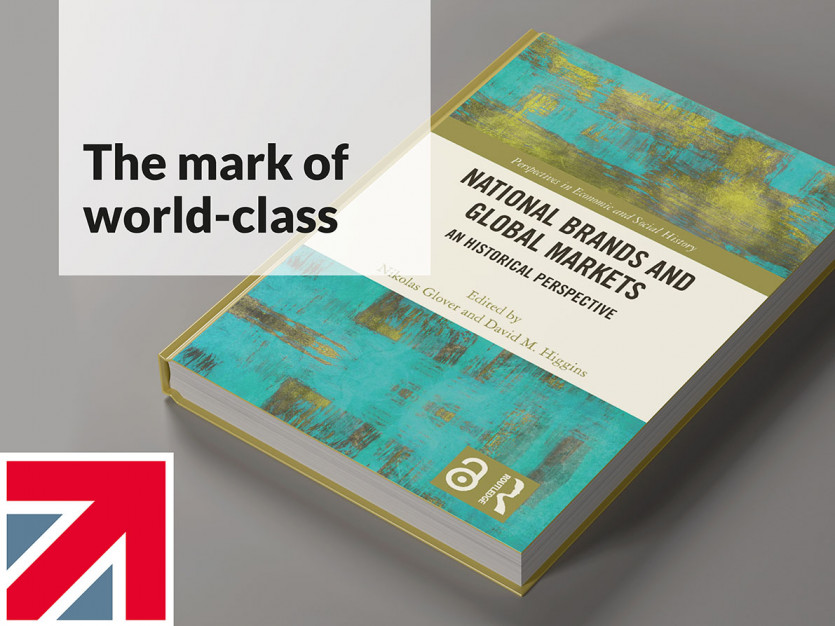By John Pearce, CEO, Made in Britain
How does the official Made in Britain trade mark attract so many great companies to commit to the licence and apply the award-winning Mark to their British-made goods? What is the secret ingredient that makes our trade mark so attractive to manufacturers and so useful to consumers?
Members can find out how the Made in Britain mark and our organisation fits into a broader, global identification and recognition of manufactured goods, in the newly published book National Brands and Global Markets, edited by Prof. David M. Higgins, Lecturer at the Newcastle University Business School and Nikolas Glover, Senior Lecturer/Associate Professor at the Department of Economic History, Uppsala Centre for Business History in Sweden.
Of special interest to Made in Britain members, the concluding chapter 13, ‘Made in Britain’ vs ‘Made in Britain?' was written by David M. Higgins after years of research on the Made in Britain organisation and draws on some of our members’ own reflections on precisely why they feel so strongly about the trade mark and the membership group. The chapter paints a very positive picture of an organisation that is governed by its members on the board of non-executives, and focused very clearly on bringing benefit to the membership group – British manufacturing businesses.
If you would like to purchase a copy of the book, published on-line and in print by Routledge. Members of Made in Britain can get a 20% discount by entering the code MIB23 at the checkout. Purchase your copy by clicking here.
.gif)
The authors are both scholars that have studied the impact and durability of national branding campaigns and other marketing strategies for manufactured products from the provenance marketing and nation branding point of view. Using proven methodologies of place marketing, business history, and combining it with business ethics and standards to promote a product sector has been going on for many decades, with varying degrees of success. The books contains chapters on Made in Austria, Sweden, Italy and France, interwoven with other provenance and nation brand themes each produced by one of a team of specialist authors all equally passionate about nation and product branding.
Also of interest, in other chapters of the book is some of the history of place branding and product campaigning. Members of a certain age group may recall some of the trademarks and public awareness campaigns through recent history that were aimed at identifying a certain kind of product made in the UK. The famous triangular Kite Mark has been around for more than 100 years, but not all collective and licence marks need such a long time to enter into the public consciousness. Shoppers browsing supermarket shelves for good quality food made by trustworthy producers know to look out for the Red Tractor mark, launched in 2000. Efforts like these, designed to steer consumer behaviour and provide a positive boost for British industry play a vital role in the public narrative of producer and consumer responsibilities.
The Made in Britain trade mark, and the organisation that protects it, goes a lot further than just providing a trustworthy, official identity. It is also a platform for promoting a growing independent community of responsible businesses that are learning from each other. They’re helping each other to know how best to take advantage of all the evidence there is that buying a product closer to where it is needed is good for the planet, good for society and very good for the economy. There is also an open-to-everyone database and business news platform with everything anyone could need to know about the manufacturing sector, including 1000s of great news stories about our members succeeding in so many ways including as export champions.
Since joining the organisation in April, 2015, then getting to know 100s of our members’ factories in every corner and county of the UK, I’ve learned a lot about the highest common denominators of successful, responsible British manufacturing. I’ve understood some of the secrets to their longevity, resilience, creativity and sustainability.
There are ‘Made In’ campaigns, logos and organisations all over the world and what we now know based on evidence from historians, writers and scholars is that Made in Britain compares very favourably with many of them, and really does contribute to the promotion and growth of great British manufacturing.
If you would like to purchase a copy of the book, published on-line and in print by Routledge. Members of Made in Britain can get a 20% discount by entering the code MIB23 at the checkout. Purchase your copy by clicking here.
Code expires 9th May 2023.
By Made in Britain 2 years ago | By Made in Britain
